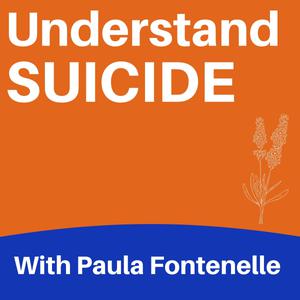
Understand Suicide
Paula Fontenelle
Here we will create a safe community to fight the stigma surrounding suicide. I will interview specialists, survivors, and individuals who have a story to tell. We will cover a variety of themes: grief, warning signs, risk factors, contagion, youth, and most importantly, what can be done to prevent suicide. To contact me, send a message to [email protected] Visit my page: www.understandsuicide.com Facebook Page: https://bit.ly/2MMLBWO
- 25 minutes 20 secondsEp. 116 - How parents can help kids at risk | Nicole and Caroline
My guests today are Nicole Siegfried and Caroline Nichols. In this interview, they help us figure out how parents and families can help kids who struggle with suicidal thoughts, ideation, and previous attempts.
This interview is the fourth of a week-long series, during which I will be publishing at least one episode every day directly from the 57th conference of the American Association of Suicidology, AAS, in Las Vegas.
Join me daily for interviews with key speakers, researchers, and loss survivors.
Are you looking for a suicide loss support group? Join mine, it's online.
See details here: https://t.ly/YsdKG
Find Nicole and Caroline:https://lightfully.com/
Visit my page www.understandsuicide.com
Enroll in my course "How to help suicidal people"
Find my book: Understanding suicide: living with Loss, paths to Prevention
If you need to talk, contact the National Suicide Prevention Lifeline:
https://suicidepreventionlifeline.org
Phone: 800-273-8255
10 May 2024, 9:26 pm - 31 minutes 57 secondsEp. 115 - Why are support groups healing? | Joan Hoff
My guest today is Joan Hoff. She has been facilitating loss groups for over thirty years, including support groups for children, families, and suicide loss survivors. Joan lost her husband to suicide and in this interview, she shares with us her experience with her own grief and why she believes in the healing power of groups.
This interview is the third of a week-long series, during which I will be publishing at least one episode every day directly from the 57th conference of the American Association of Suicidology, AAS, in Las Vegas.
Join me daily for interviews with key speakers, researchers, and loss survivors.
Are you looking for a suicide loss support group? Join mine, it's online: https://t.ly/YsdKG
Visit my page www.understandsuicide.com
Enroll in my course "How to help suicidal people"
Find my book: Understanding suicide: living with Loss, paths to Prevention
If you need to talk, contact the National Suicide Prevention Lifeline:
https://suicidepreventionlifeline.org
Phone: 800-273-8255
9 May 2024, 9:55 pm - 21 minutes 3 secondsEp. 114 - When a therapist loses a client to suicide | Khara Croswaite
My guest today is the therapist Khara Croswaite and the topic is "When therapists lose a client to suicide." What does the grief look like? Who do we go to? What helps? What about the shame of sharing with colleagues that you have lost a client in this manner?
Khara knows some of those answers because she recently lost a client to suicide and she has been vulnerable and brave enough to share her story and publish a book about her experience. The book is entitled “Moving from Alert to Acceptance.” (link below).
This interview is the second of a week-long series, during which I will be publishing at least one episode every day directly from the 57th conference of the American Association of Suicidology, AAS, in Las Vegas.
Join me daily for interviews with key speakers, researchers, and loss survivors.
Find her book: https://amzn.to/4byBeiR
Are you looking for a suicide loss support group? Join mine, it's online: https://t.ly/YsdKG
Visit my page www.understandsuicide.com
Enroll in my course "How to help suicidal people"
Find my book: Understanding suicide: living with loss, paths to prevention
If you need to talk, contact the National Suicide Prevention Lifeline:
https://suicidepreventionlifeline.org
Phone: 800-273-8255
9 May 2024, 12:58 am - 24 minutes 31 secondsEp. 113 - Teen bereavement | Joanne Harpel
My guest today is Joanne Harpel, president of Coping after suicide and executive producer of the film “Talking Out Loud: Teen suicide loss, a Conversation.” She lost her brother Stephen to suicide in 1993. Since then, Joanne has been working on prevention and postvention, particularly with support groups.
Our focus today is teen bereavement, a topic very rarely explored even here on my podcast. I watched her film at the convention and learned so much from it that I decided to share it with you, so let’s listen to her journey and how she has transformed lives since her loss.
This interview is the first of a week-long series, during which I will be publishing at least one episode every day directly from the 57th conference of the American Association of Suicidology, AAS.
Join me daily for interviews with key speakers, researchers, and loss survivors.
Watch the film: https://t.ly/uCs1h
Are you looking for a suicide loss support group? Join mine, it's online.
See details here: https://t.ly/YsdKG
Visit my page www.understandsuicide.com
Enroll in my course "How to help suicidal people"
Find my book: Understanding suicide: living with Loss, paths to Prevention
If you need to talk, contact the National Suicide Prevention Lifeline:
https://suicidepreventionlifeline.org
Phone: 800-273-8255
7 May 2024, 10:18 pm - 2 minutes 9 secondsAnnouncement: Daily episodes this week
This week, beginning tomorrow (Tuesday), I will be publishing at least one episode every day directly from the 57th conference of the American Association of Suicidology. Join me daily for interviews with key speakers, researchers, and loss survivors.
Are you looking for an online suicide loss support group? Join mine: https://t.ly/gYW-G
Find my book "Understanding Suicide: Living with loss, paths to prevention:”
https://amzn.to/3QYe0II
Enroll in my course "How to help suicidal people."
https://bit.ly/3klNZ7n
Subscribe to my YouTube channel:
https://rb.gy/0emdk
Visit my page www.understandsuicide.com If you need to talk, contact the National Suicide Prevention Lifeline:
https://suicidepreventionlifeline.org
Phone: 9887 May 2024, 12:05 am - 47 minutes 25 secondsEp. 112 - How can a partner help with grief? | Michelle Collins
After a series of losses, including the death of her mother and her husband’s suicide, Michelle Collins combined the tools she had collected as a yoga therapist and wellness coach and studies in positive psychology and neuroscience to turn post-traumatic stress disorder into post-traumatic growth and resilience.
She is the author of two books: “Surviving Spousal or partner suicide loss: A Mindful Guide for Your Journey Through Grief” and “Supporting a Survivor of spouse of partner suicide loss: A Mindful Guide for Co-journeying Through Grief.”
In this interview, we focus on how a partner or spouse can help their loved one through suicide loss.
Find Michelle: https://inhabitjoy.com/
Are you looking for an online suicide loss support group? Join mine: https://t.ly/gYW-G
Find my book "Understanding Suicide: Living with loss, paths to prevention:” https://amzn.to/3QYe0II
Enroll in my course "How to help suicidal people." https://bit.ly/3klNZ7n
Subscribe to my YouTube channel: https://rb.gy/0emdk
Visit my page www.understandsuicide.com
If you need to talk, contact the National Suicide Prevention Lifeline: https://suicidepreventionlifeline.org
Phone: 988
2 April 2024, 12:24 am - 2 minutes 13 secondsNeed an online suicide loss support group?Are you looking for an online Suicide loss support group? We all know how heartbreaking this kind of loss is, and how we tend to isolate ourselves because we believe nobody will either listen to us or understand what we're going through. That’s when a support group can be a source of comfort, familiarity, and compassion, no matter where you are in your grief journey. And you might just find some peace in knowing you're not alone. So why not give it a try? You never know how much it could help until you take that first step. The one thing I can guarantee you is that I will offer a warm, safe, and nurturing space, as provided here on my podcast. The group meets every second Tuesday of the month, on Zoom. Join the March meeting, February is full. We have a limit of 12 participants. REGISTER HERE: https://t.ly/7gUed Paula2 February 2024, 12:52 am
- 51 minutes 55 secondsEp. 111 - He lost his mother at age seven | Dr. Richard Brockman
Richard Brockman is Clinical Professor of Psychiatry at Columbia University, College of Physicians and Surgeons, and Attending Clinical Psychiatrist at Columbia Presbyterian Medical Center. When he was seven years old he found his mother’s body after she died of suicide. This traumatizing experience re-shaped the narrative of his life.
In his book, "Life After Death: Surviving Suicide,” Dr. Brockman he shares the memories of his childhood, the many gaps he has in those memories, and how the man survived while the boy tried to make sense of it all.
Find Dr. Brockman: https://www.cugmhp.org/faculty/richard-brockman-md/
Buy his book: https://amzn.to/3SbxJqk
Are you looking for a suicide loss support group? Join mine, it's online. See details here: https://t.ly/qcCC9
Find my book "Understanding Suicide: Living with loss, paths to prevention:”
Enroll in my course "How to help suicidal people."
Subscribe to my YouTube channel:
Visit my page www.understandsuicide.com
If you need to talk, contact the National Suicide Prevention Lifeline:
https://suicidepreventionlifeline.org
Phone: 988
25 January 2024, 6:53 pm - 54 minutes 14 secondsEp. 110 - Two sisters grieving their mother's suicide | Kristyna and Veronika
Kristyna and Veronika Delmar are from the Czech Republic and they lost their mother to suicide a little over a year ago. In this interview, they share with us the different paths they took to live through their grief.
Kristyna tried to “learn" everything she could about the topic by reading books and trying to get in touch with people who were going through the same kind of loss. Veronika was the one who found their mother, so this shock permeated her pain and it still does. She still tries to suppress her emotions and acknowledges that anger is still taking center stage.
This moving interview touches on a universal theme when it comes to suicide: how do families deal with each other’s grief journeys? Is it possible to respect and support each other through suicide loss? Their candid story shows us that nothing is more healing than love, compassion, and the understanding that when suicide happens, we are inherently bound by a shared loss.
Are you looking for an online suicide loss support group? Join mine. See details here: https://t.ly/qcCC9
Find my book "Understanding Suicide: Living with loss, paths to prevention:”
Enroll in my course "How to help suicidal people."
Subscribe to my YouTube channel:
Visit my page www.understandsuicide.com
If you need to talk, contact the National Suicide Prevention Lifeline:
https://suicidepreventionlifeline.org
Phone: 988
14 November 2023, 8:00 pm - 1 minute 4 secondsAccepting new clients
From time to time, some of my listeners contacted me for therapy but in the past, I have not been able to accept new clients due to a lengthy waiting list. That has recently changed because I just opened my own practice, so I am taking new patients and have a few available spots.
If you are searching for a therapist and you live in Oregon, in the US, contact me. I give a free 15-minute consultation so that we can see if we are a good fit.
I'm not taking insurance at the moment.
My phone number: 971 2361388
Email: [email protected]
Have a great day.
22 September 2023, 10:48 pm - 1 hour 6 minutesEp. 109 - Spirituality as a path to healing | Suzanne Anderson
Suzanne Anderson lost her husband David to suicide and with it, her life as she knew it. As it happens in many cases, after his death, she found out secrets he kept from her, so she had to rebuild not only her life but her internal experience of what they had shared and built together. In this interview, she shares her path and how her spiritual beliefs helped her through it. Suzanne is the author of the book “You Make Your Path By Walking”, which accompanies readers on their own journeys through the barren landscape of trauma and grief, offering comfort, guidance, and inspiration to make meaning out of loss. Whether you are going through a personal dark night or struggling with these uncertain and disruptive global times, this book offers a proven pathway to allow the breaking down to be the breaking open into a whole new way of living, loving, and leading. Drawing from her years of exploration into the development of human potential and the personal, shattering journey of loss, Suzanne guides you to make your own path through the darkest of times—and to become a light in the world that others can look to in their own times of need. Find her book: https://mysterialwoman.com/you-make-your-path-by-walking/ Enroll for her next Resilience Circle: https://mysterialwoman.com/equinox-resilience-circle/ Contact Suzanne Anderson: https://mysterialwoman.com/
Are you looking for an online suicide loss support group? Join mine. See details here: https://t.ly/qcCC9
Find my book "Understanding Suicide: Living with loss, paths to prevention:” https://amzn.to/3QYe0II Enroll in my course "How to help suicidal people." https://bit.ly/3klNZ7n Subscribe to my YouTube channel: https://rb.gy/0emdk Visit my page www.understandsuicide.com If you need to talk, contact the National Suicide Prevention Lifeline: https://suicidepreventionlifeline.org Phone: 988
19 September 2023, 6:32 pm - More Episodes? Get the App
Your feedback is valuable to us. Should you encounter any bugs, glitches, lack of functionality or other problems, please email us on [email protected] or join Moon.FM Telegram Group where you can talk directly to the dev team who are happy to answer any queries.
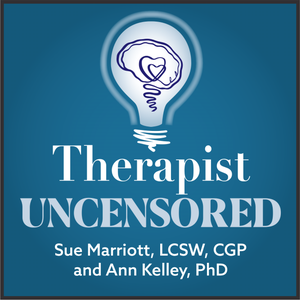 Therapist Uncensored Podcast
Therapist Uncensored Podcast
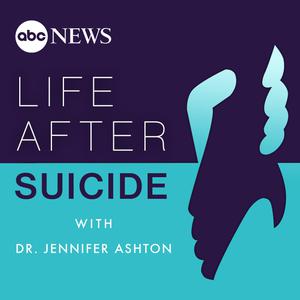 Life After Suicide
Life After Suicide
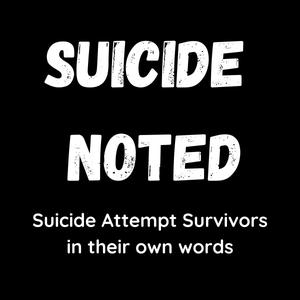 Suicide Noted
Suicide Noted
 The Leftover Pieces; Suicide Loss Conversations
The Leftover Pieces; Suicide Loss Conversations
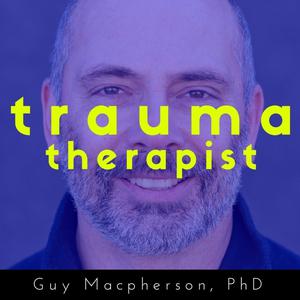 The Trauma Therapist
The Trauma Therapist
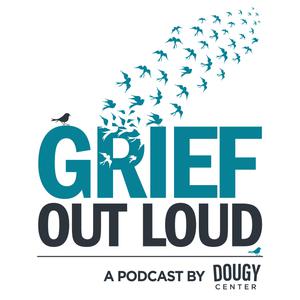 Grief Out Loud
Grief Out Loud